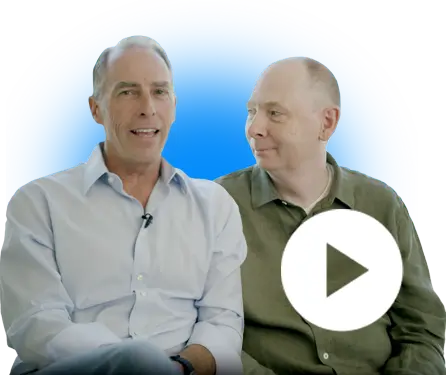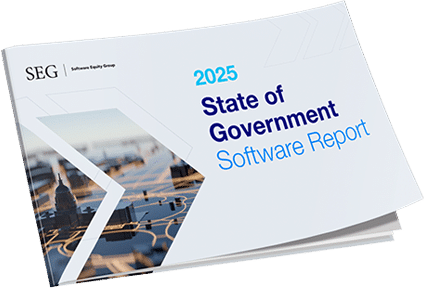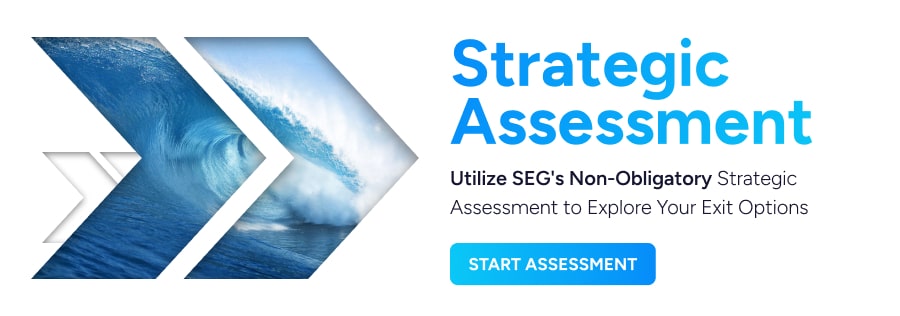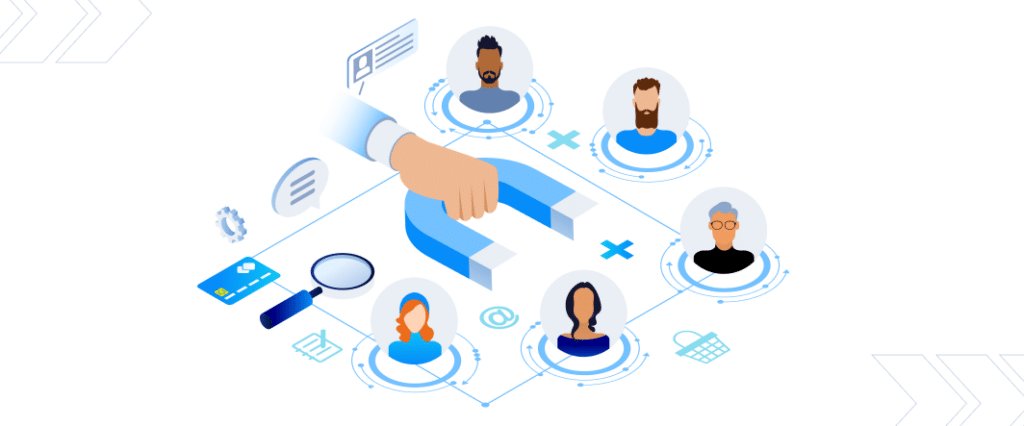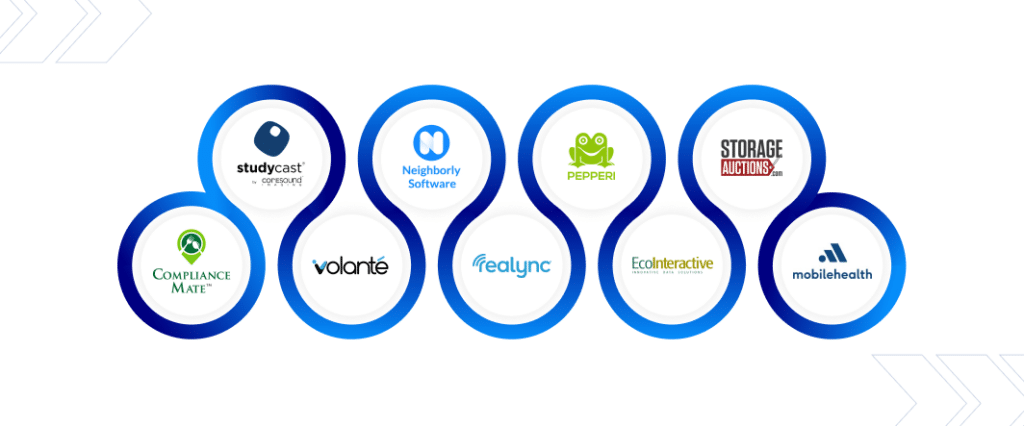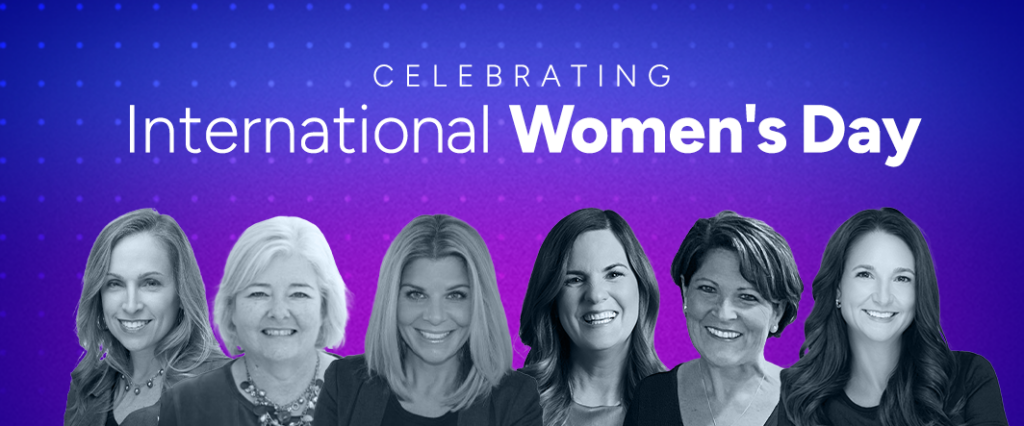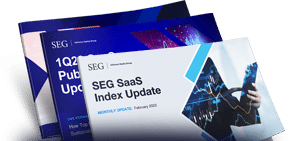18 Tips and Best Practices to Help SMBs Win Enterprise Clients

Many small and mid-sized SaaS companies dream of landing those coveted enterprise clients. The prospect of securing large, long-term contracts with established organizations is undeniably appealing. Enterprise clients represent an opportunity for significant growth, recurring revenue streams, and the chance to establish your company as a trusted industry leader. However, the complexities of the enterprise sales cycle can seem daunting for SMBs.
Here at SEG, we understand this challenge. We work with numerous SaaS companies seeking majority investment or a strategic sale, and a recurring theme is the desire to crack the enterprise code. Today, I’m excited to share insights from Sandra de Novellis of Evolve Marketing. Sandra is a recognized expert in B2B enterprise sales strategies, and she’s developed a proven framework specifically to help SMBs compete and win in the enterprise market.
In this blog post, we’ll delve into Sandra’s insights, exploring effective methodologies, essential tools, and strategic educational approaches. By following these steps, you can equip your SaaS company to navigate the complexities of the enterprise sales cycle.
Building a Sales Playbook: Defining Your Methodology
A well-defined sales methodology is the foundation of any strong B2B sales strategy for SaaS companies. Think of it as your sales playbook—a structured approach that guides your team’s interactions with prospects and customers. It ensures everyone’s on the same page, using standardized tactics to build relationships and close deals.
The methodology you choose sets the overall tone for your sales team’s approach. For enterprise sales, methodologies like Challenger Sales and Consultative Selling are particularly effective. These emphasize building strong relationships, genuinely understanding customer needs, and crafting personalized solutions that address their unique challenges.
So, how do you pick the perfect methodology for navigating the complex landscape of the enterprise market? Sandra says, “There’s no single ‘one size fits all’ answer.” But she suggests a few methodologies that work well with B2B enterprise clients:
- Customer-Centric Selling: This approach puts the customer’s needs front and center. It’s all about understanding their pain points, creating a personalized experience, and positioning your product as the solution they’ve been searching for.
- Challenger Sales: Here, your sales reps become trusted advisors, encouraging prospects to challenge their assumptions and explore innovative solutions that meet their specific needs.
- Consultative Selling: This methodology positions your sales reps as trusted advisors. They work closely with prospects to identify their needs, explore solutions, and ultimately make informed decisions.
- Value Selling: The focus here is on clearly communicating the tangible benefits and ROI your product delivers, differentiating it from the competition.
- Target Account Selling (TAS): This strategy involves identifying high-potential target accounts, concentrating your sales efforts on these key accounts, and building strong relationships with decision-makers. It’s also known as Account Based Marketing (ABM).
Remember, there’s no single “magic bullet” methodology for SaaS sales. The key is to find the one that best aligns with your company culture, product offering, and target market. Once you’ve chosen your methodology, customize it to fit your specific needs and build a winning sales strategy around it.
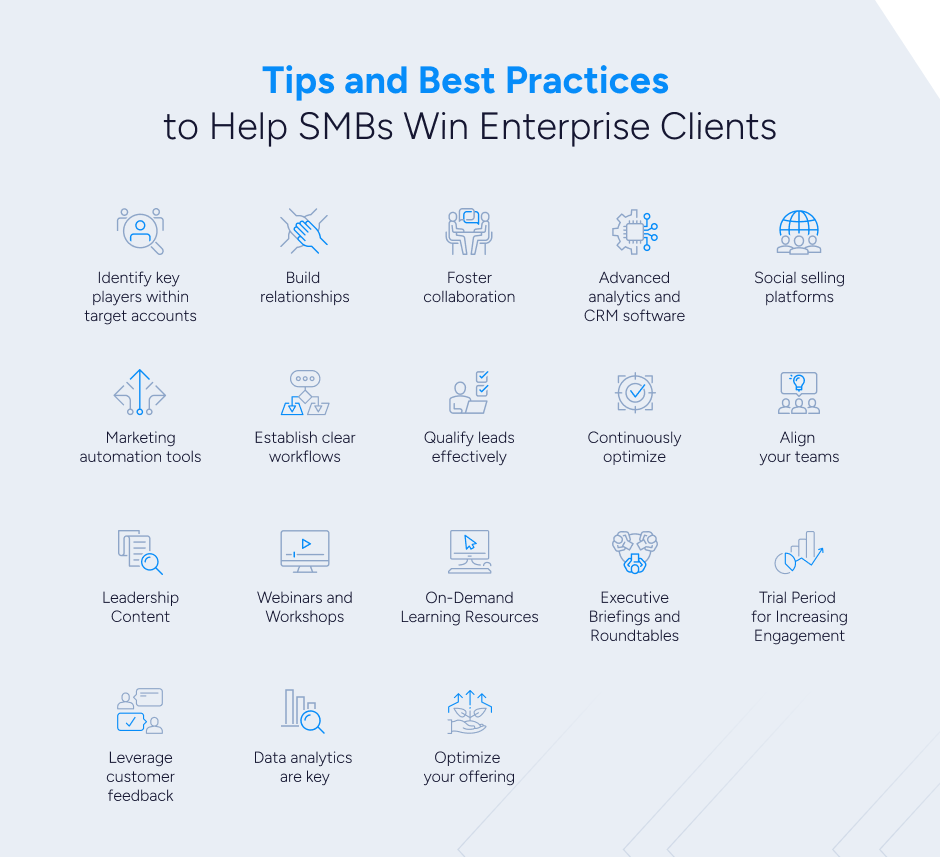
Empowering Teams Through People, Tools, and Processes
Enterprise sales cycles are marathons, not sprints. Deals often involve extended engagement with prospects who are making significant investments. Understandably, decision-makers proceed cautiously, conducting thorough due diligence before committing. Your sales team needs to anticipate and accommodate these extended timelines, focusing on building trust and credibility throughout the process.
Sandra emphasizes the importance of supporting your sales team during this marathon.
Here are a few ways to do so:
Define Your Ideal Customer Profile (ICP):
To start: Who are your rockstar clients? Analyze your top 10 customers. Then ask, how much revenue do they bring in? What value do they experience from your product? Look for commonalities like industry, company size, and pain points.
Once you’ve identified your ICP, your team can target high-value prospects and tailor messaging that resonates with their specific needs.
Here are some tips for doing this:
1. Identify key players within target accounts: This includes C-level executives, department heads, and influencers.
2. Build relationships: Leverage existing connections, seek referrals for warm introductions, and attend industry events where your target audience will be.
3. Foster collaboration: Encourage teamwork between sales, marketing, and customer success teams to ensure alignment and continuity throughout the customer journey.
Marketing Tools: Quality Over Quantity
Forget about buying lists or scraping the web. Sandra highlights the importance of building relationships and generating targeted leads that align with your ICP.
Focus on tactics like outbound prospecting, referral programs, and strategic partnerships to identify decision-makers and engage with them on a personal level. There are many tools and firms out there, so choose the ones that provide the most value for your B2B SaaS sales strategy.
Here are some suggestions from Sandra to consider:
4. Advanced analytics and CRM software: Tools like Salesforce and Pipedrive offer valuable insights into prospect behavior and preferences.
5. Social selling platforms: Leverage LinkedIn Sales Navigator to identify decision-makers and engage with them authentically.
6. Marketing automation tools: Streamline lead generation, nurturing, and automate conversion processes with tools like HubSpot or Eloqua, maximizing efficiency and scalability.
Streamline Sales Processes: Efficiency is Key
Implementing efficient and streamlined sales processes is paramount to navigating the complexities of enterprise sales cycles. Develop a structured framework that includes account visibility, active pipeline management, and standardized procedures. Leverage sales enablement tools to automate administrative tasks, provide real-time guidance to sales reps, and enhance collaboration across teams.
Below are some additional tips from Sandra:
7. Establish clear workflows: Guide representatives through each stage of the sales cycle with well-defined processes. This improves forecasting and quarterly sales projections.
8. Qualify leads effectively: Prioritize opportunities by implementing robust lead qualification criteria. This allows you to focus resources on high-potential prospects and deliver relevant content based on their buying stage.
9. Continuously optimize: Regularly review and improve your sales methodologies and strategies based on performance metrics and market feedback.
10. Align your teams: Conduct weekly sales and marketing meetings to ensure consistent messaging and timely follow-up with leads.
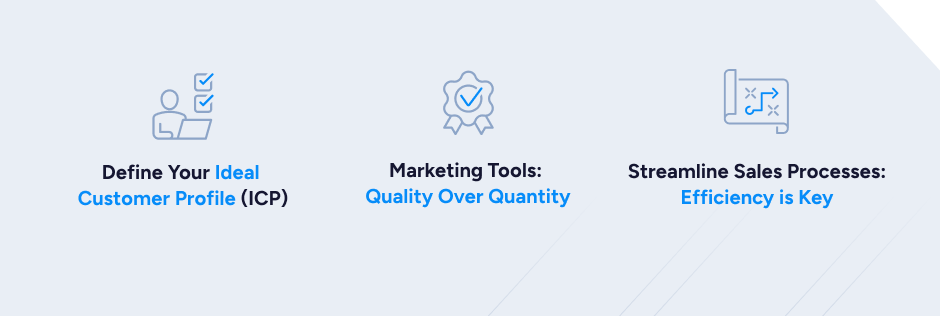
Education as a Strategic Imperative
In the world of enterprise sales, education emerges as a powerful differentiator, both before and after the sale. Organizations can establish themselves as trusted advisors and industry experts by providing prospects with valuable insights, industry knowledge, and thought leadership content.
Here are some effective educational strategies for your B2B sales strategy targeting the enterprise, as suggested by Sandra:
11. Leadership Content: Develop and disseminate white papers, case studies, and research reports that address key industry trends, challenges, and best practices.
12. Webinars and Workshops: Host educational webinars and interactive workshops to showcase product capabilities, share industry insights, and address customer pain points.
13. On-Demand Learning Resources: Create a library of educational resources, including articles, videos, and tutorials, that prospects can access at their convenience.
14. Executive Briefings and Roundtables: Organize exclusive executive briefings and roundtable discussions to facilitate peer-to-peer learning and networking opportunities.
15. Trial Period for Increasing Engagement: Delivering personalized and interactive product demos are crucial for moving prospects through the sales funnel in an Enterprise environment. Shorten trial periods to create a sense of urgency but ensure enough time to experience the value your product offers. Sandra emphasizes the importance of tailoring demos to address the prospect’s specific needs and challenges.
Performance Metrics and Measurement
Begin by identifying and tracking key metrics indicative of sales performance and customer success. Metrics such as Customer Lifetime Value (CLV), Customer Acquisition Cost (CAC), Monthly Recurring Revenue (MRR), revenue per customer, and Churn Rate all provide valuable insights into the health of your sales process and overall business.
Prioritize churn management to maintain long-term customer relationships and maximize revenue. Implement strategies to proactively identify and address churn drivers, such as improving onboarding experiences, enhancing product features, and refining your product-market fit.
Here are some additional tips from Sandra:
16. Leverage customer feedback: Gather feedback through surveys, interviews, and support tickets to understand why customers churn.
17. Data analytics are key: Utilize data analytics to identify trends and patterns that may indicate churn risk.
18. Optimize your offering: Continuously optimize your product and service offerings based on customer feedback and data insights to minimize churn and achieve optimal SaaS growth.
Conquering the Enterprise Market
Enterprise sales, once a seemingly unattainable goal for SMB companies, are now within reach. The key lies in a strategic shift—moving from a transactional mindset to one focused on building long-term, value-driven relationships.
By understanding the unique needs and challenges of enterprise clients, you can tailor your approach to resonate with their specific pain points. Invest in the right tools and methodologies to streamline your sales process, empower your team, and nurture trust throughout the buying journey.
Remember, the enterprise market is a marathon, not a sprint. Patience, persistence, and a commitment to delivering exceptional value are paramount for success. The rewards, however, are significant: the chance to not only land coveted enterprise clients but also establish your SaaS company as a trusted industry leader.
